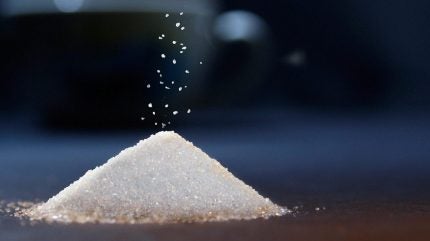
UK food companies have cut the content of sugar and salt, a report suggests, but there is a disparity between large and small manufacturers.
A new report from industry body the Food and Drink Federation (FDF), with data from market research company Kantar, has shown UK small- and medium-sized enterprises (SMEs) struggle to reformulate HFSS (high in fats, sugars and salt) products.

Discover B2B Marketing That Performs
Combine business intelligence and editorial excellence to reach engaged professionals across 36 leading media platforms.
In the report, products from FDF members, including the local operations of General Mills and Kellogg, now contribute 13% fewer calories, 15% fewer sugars and 24% less salt to the average shopping basket than they did in 2015.
However, the organisation also reported: “FDF’s largest companies have on average reduced the Nutrient Profile Model (NPM) score of their products by 11%, which is nearly four times the reduction achieved by our wider membership.”
The FDF’s chief scientific officer Kate Halliwell said: “This data demonstrates that more support is needed to help smaller businesses match the innovation and output of the larger companies. With 97% of the food and drink industry made up of small to medium-sized companies, these companies can play an important role in providing healthier options but many do not have the resources, or technical expertise, to reformulate their products.
“The industry stands ready to work with government to drive further innovation within our sector, and to work in partnership to power the health of our workforce and communities across the UK.”

US Tariffs are shifting - will you react or anticipate?
Don’t let policy changes catch you off guard. Stay proactive with real-time data and expert analysis.
By GlobalDataShe added: “Although on its own reformulation can only take us so far on the journey towards supporting healthier and more sustainable dietary patterns, it is encouraging to see the progress shown by this new data and that there is consideration for how to ensure all businesses – regardless of size – get the support they need to improve the nutrient profile of their products.”
Elaine Hindal, chief executive of the British Nutrition Foundation, added: “Reformulation has an important part to play in helping people to have healthier diets, through improving the nutrient profile of food.”
This latest report follows the resignation of Henry Dimbleby from his role as a government adviser. The Leon food chain founder – the man behind the government’s National Food Strategy – stated the “ideology of the Conservative Party and the way that they are dealing with the problem of diet-related disease makes no sense”.
Dimbledby had suggested the implementation of a sugar and salt tax back in 2021.
Restrictions planned for October last year on buy-one-get-one-free deals and TV and online advertising for HFSS products have been delayed. A ban on multi-buy deals was pushed back until October 2023 while a ban on TV advertising of junk foods before the 9pm watershed was delayed to October 2025.
Professor Graham MacGregor, chair of Action On Salt, a campaigning organisation raising awareness on salt content in food, said in a statement to Just Food: “Whilst it’s encouraging to see that progress has been made by a few food manufacturers in reducing salt, sugar and calories in some of their products, overall there has been far too little action.
“We now need a more radical approach with mandatory enforcement of more challenging targets to reduce salt, sugar and calories if we wish to stop people dying unnecessarily from unhealthy food. This is now the biggest cause of death and suffering in the world and this needs to change.”





